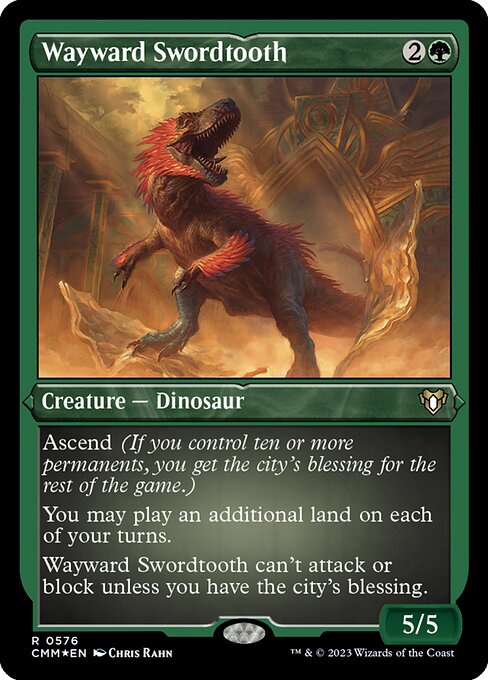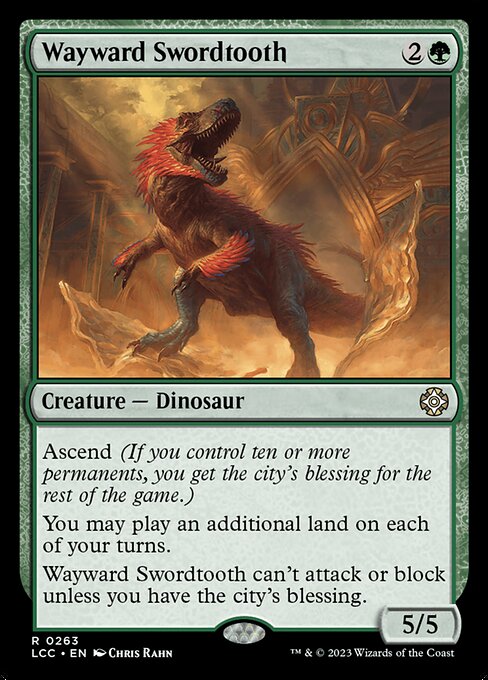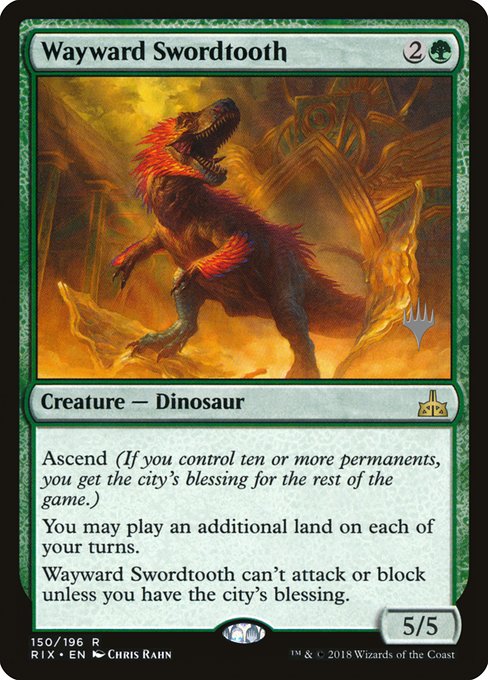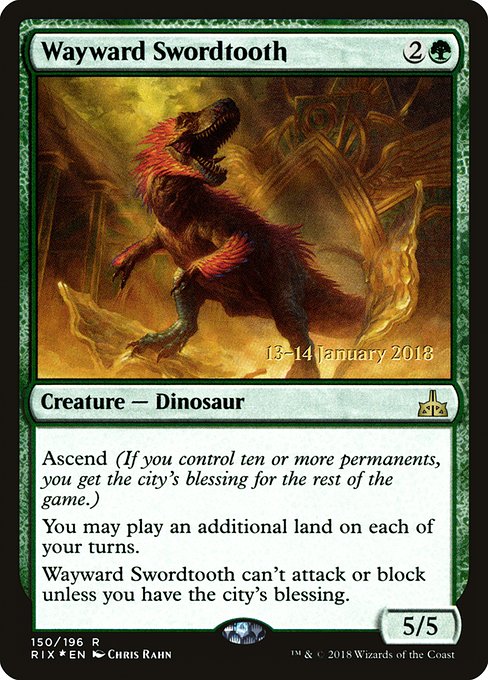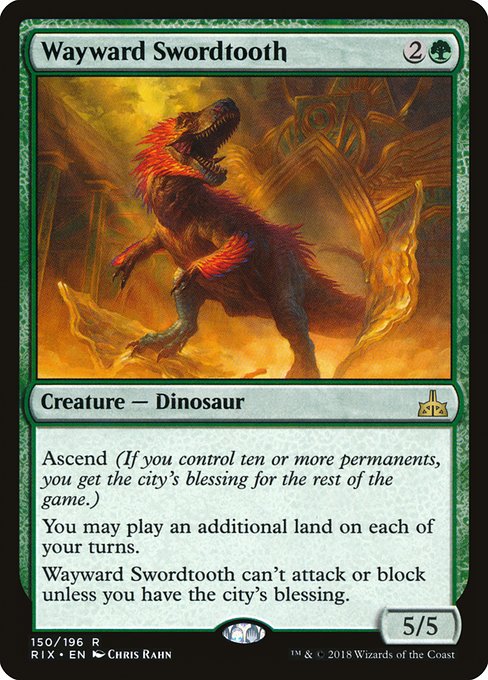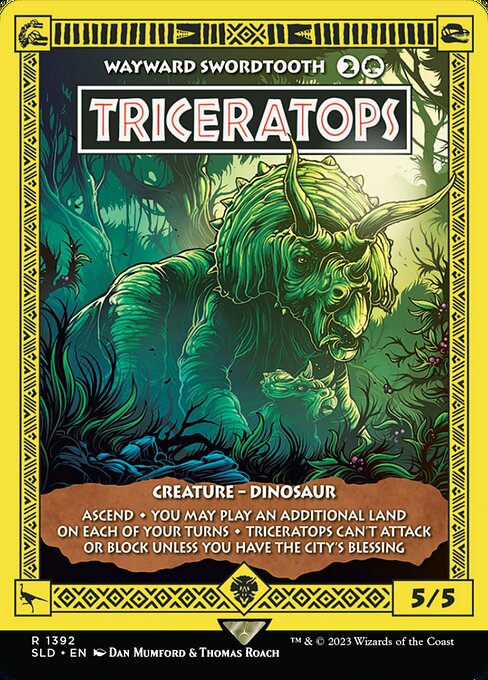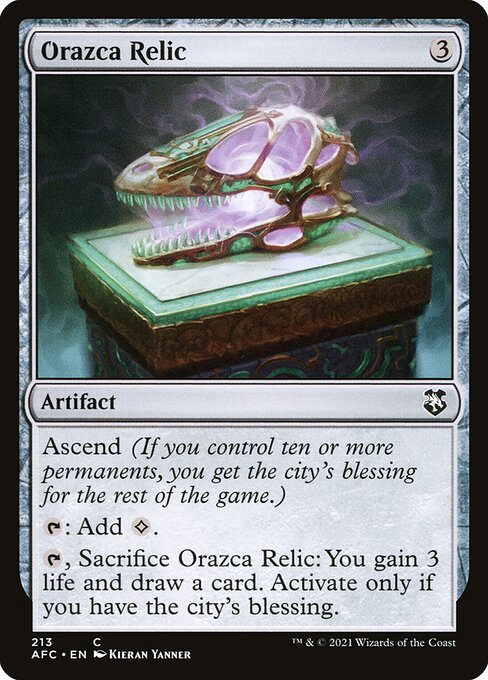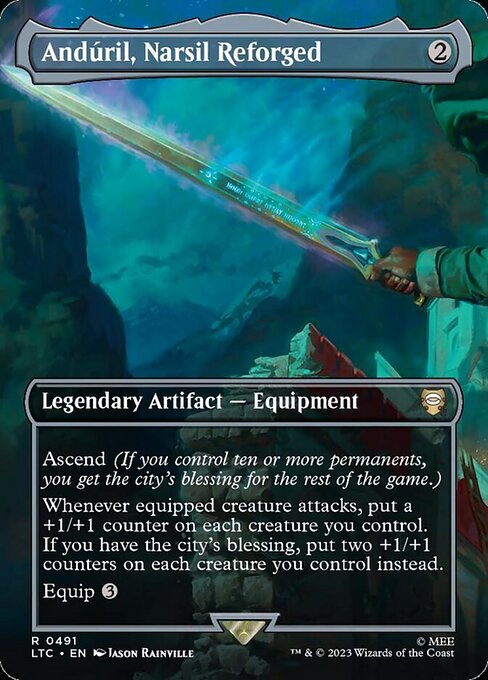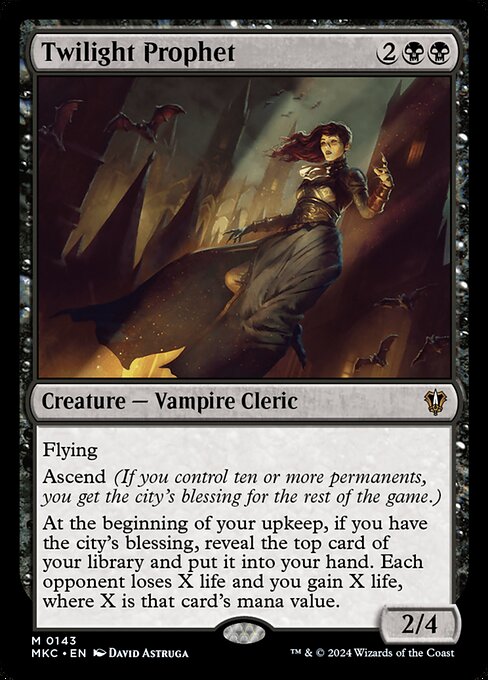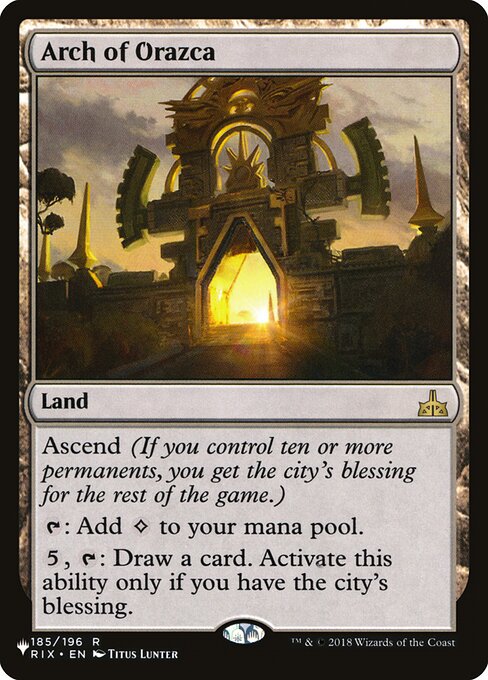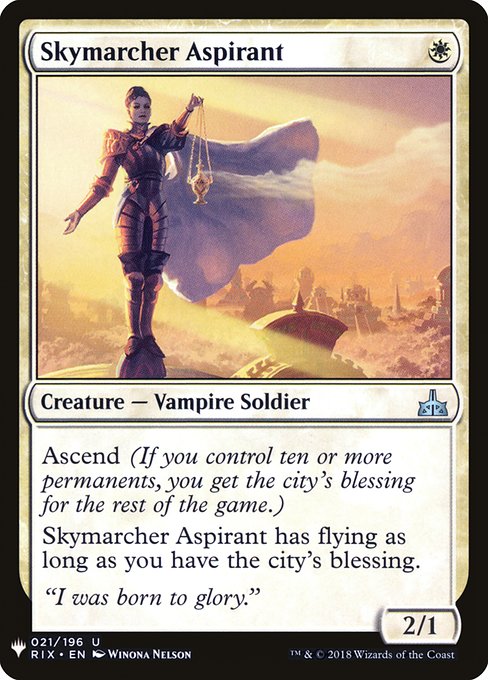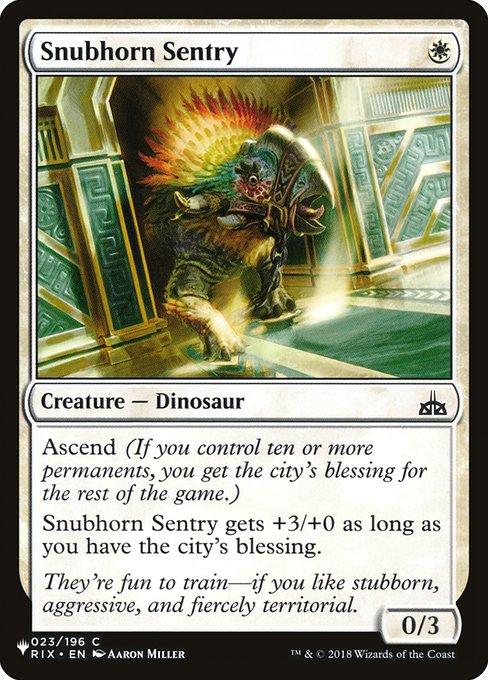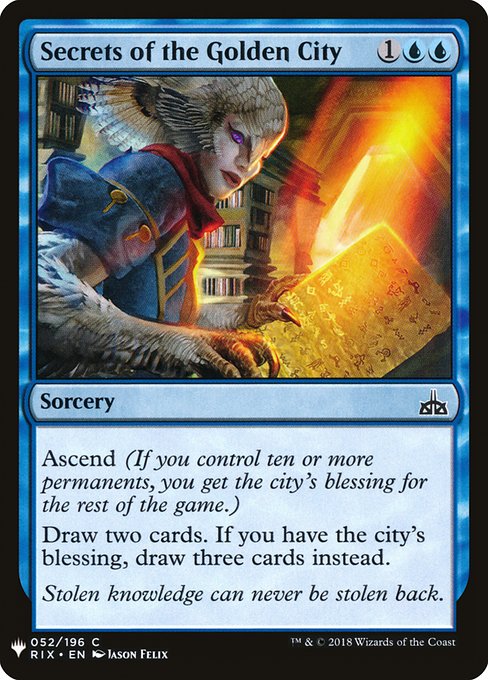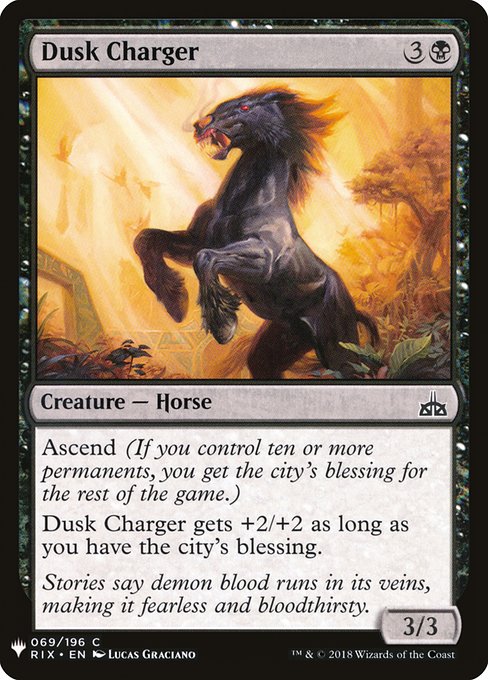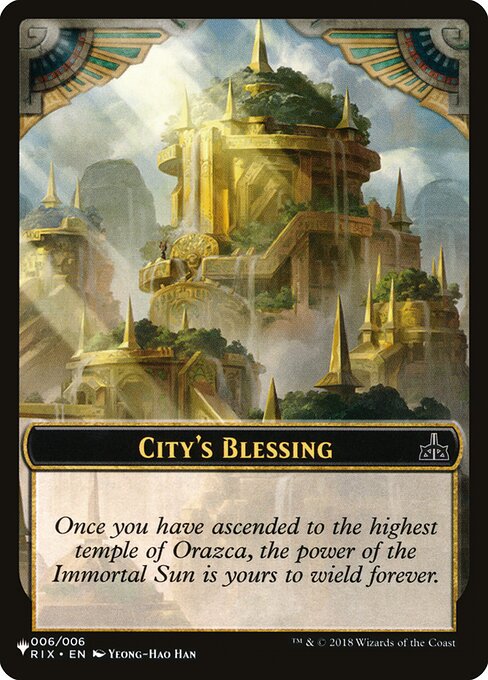Crocs-de-sabre rétif
Créature : dinosaure
Ascension (Si vous contrôlez au moins dix permanents, vous gagnez l'agrément de la cité pour le reste de la partie.)
Vous pouvez jouer un terrain supplémentaire pendant chacun de vos tours.
Le Crocs-de-sabre rétif ne peut ni attaquer ni bloquer à moins que vous n'ayez l'agrément de la cité.
Vous pouvez jouer un terrain supplémentaire pendant chacun de vos tours.
Le Crocs-de-sabre rétif ne peut ni attaquer ni bloquer à moins que vous n'ayez l'agrément de la cité.
5/5
standard
future
historic
gladiator
pioneer
explorer
modern
legacy
pauper
vintage
penny
commander
brawl
alchemy
paupercommander
duel
oldschool
premodern
Rulings
If you cast a spell with ascend, you don’t get the city’s blessing until it resolves. Players may respond to that spell by trying to change whether you get the city’s blessing.
A permanent is any object on the battlefield, including tokens and lands. Spells and emblems aren’t permanents.
Wayward Swordtooth’s middle ability is cumulative if you control more than one. It’s also cumulative with other effects that let you play additional lands, such as the one from Enter the Unknown.
If your tenth permanent enters the battlefield and then a permanent leaves the battlefield immediately afterwards (most likely due to the “Legend Rule” or due to being a creature with 0 toughness), you get the city’s blessing before it leaves the battlefield.
Once you have the city’s blessing, you have it for the rest of the game, even if you lose control of some or all of your permanents. The city’s blessing isn’t a permanent itself and can’t be removed by any effect.
If you control ten permanents but don’t control a permanent or resolving spell with ascend, you don’t get the city’s blessing. For example, if you control ten permanents, lose control of one, then cast Golden Demise, you won’t have the city’s blessing and the spell will affect creatures you control.
Ascend on a permanent isn’t a triggered ability and doesn’t use the stack. Players can respond to a spell that will give you your tenth permanent, but they can’t respond to getting the city’s blessing once you control that tenth permanent. This means that if your tenth permanent is a land you play, players can’t respond before you get the city’s blessing.
A permanent is any object on the battlefield, including tokens and lands. Spells and emblems aren’t permanents.
Wayward Swordtooth’s middle ability is cumulative if you control more than one. It’s also cumulative with other effects that let you play additional lands, such as the one from Enter the Unknown.
If your tenth permanent enters the battlefield and then a permanent leaves the battlefield immediately afterwards (most likely due to the “Legend Rule” or due to being a creature with 0 toughness), you get the city’s blessing before it leaves the battlefield.
Once you have the city’s blessing, you have it for the rest of the game, even if you lose control of some or all of your permanents. The city’s blessing isn’t a permanent itself and can’t be removed by any effect.
If you control ten permanents but don’t control a permanent or resolving spell with ascend, you don’t get the city’s blessing. For example, if you control ten permanents, lose control of one, then cast Golden Demise, you won’t have the city’s blessing and the spell will affect creatures you control.
Ascend on a permanent isn’t a triggered ability and doesn’t use the stack. Players can respond to a spell that will give you your tenth permanent, but they can’t respond to getting the city’s blessing once you control that tenth permanent. This means that if your tenth permanent is a land you play, players can’t respond before you get the city’s blessing.
Rulings
If you cast a spell with ascend, you don’t get the city’s blessing until it resolves. Players may respond to that spell by trying to change whether you get the city’s blessing.
A permanent is any object on the battlefield, including tokens and lands. Spells and emblems aren’t permanents.
Wayward Swordtooth’s middle ability is cumulative if you control more than one. It’s also cumulative with other effects that let you play additional lands, such as the one from Enter the Unknown.
If your tenth permanent enters the battlefield and then a permanent leaves the battlefield immediately afterwards (most likely due to the “Legend Rule” or due to being a creature with 0 toughness), you get the city’s blessing before it leaves the battlefield.
Once you have the city’s blessing, you have it for the rest of the game, even if you lose control of some or all of your permanents. The city’s blessing isn’t a permanent itself and can’t be removed by any effect.
If you control ten permanents but don’t control a permanent or resolving spell with ascend, you don’t get the city’s blessing. For example, if you control ten permanents, lose control of one, then cast Golden Demise, you won’t have the city’s blessing and the spell will affect creatures you control.
Ascend on a permanent isn’t a triggered ability and doesn’t use the stack. Players can respond to a spell that will give you your tenth permanent, but they can’t respond to getting the city’s blessing once you control that tenth permanent. This means that if your tenth permanent is a land you play, players can’t respond before you get the city’s blessing.
A permanent is any object on the battlefield, including tokens and lands. Spells and emblems aren’t permanents.
Wayward Swordtooth’s middle ability is cumulative if you control more than one. It’s also cumulative with other effects that let you play additional lands, such as the one from Enter the Unknown.
If your tenth permanent enters the battlefield and then a permanent leaves the battlefield immediately afterwards (most likely due to the “Legend Rule” or due to being a creature with 0 toughness), you get the city’s blessing before it leaves the battlefield.
Once you have the city’s blessing, you have it for the rest of the game, even if you lose control of some or all of your permanents. The city’s blessing isn’t a permanent itself and can’t be removed by any effect.
If you control ten permanents but don’t control a permanent or resolving spell with ascend, you don’t get the city’s blessing. For example, if you control ten permanents, lose control of one, then cast Golden Demise, you won’t have the city’s blessing and the spell will affect creatures you control.
Ascend on a permanent isn’t a triggered ability and doesn’t use the stack. Players can respond to a spell that will give you your tenth permanent, but they can’t respond to getting the city’s blessing once you control that tenth permanent. This means that if your tenth permanent is a land you play, players can’t respond before you get the city’s blessing.
Votre collection ? vos decks ?
Envie de gérer votre collection et/ou créer des decks ?
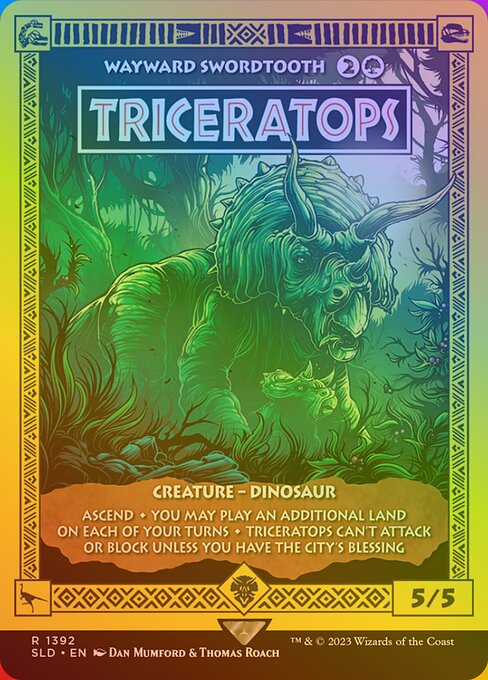

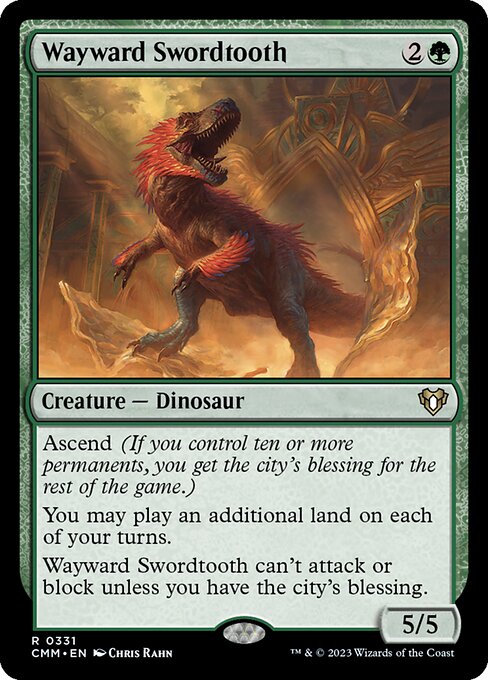
 0
0
 1.85€
1.85€
